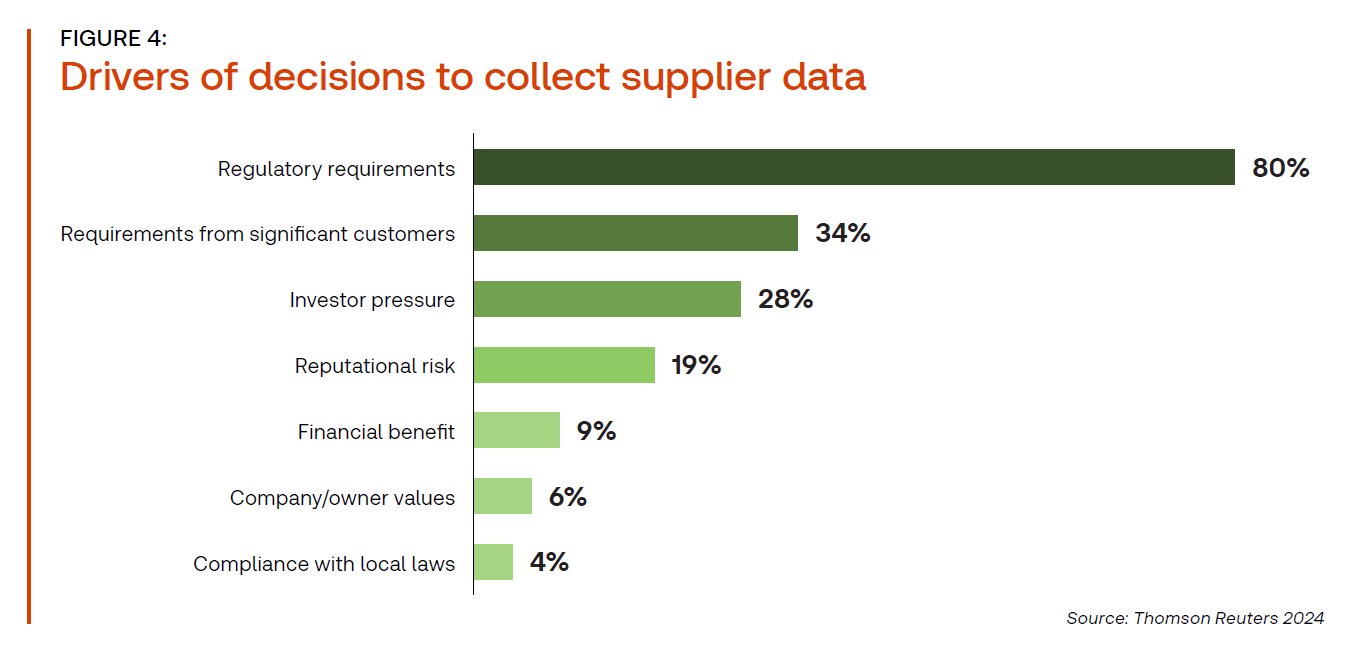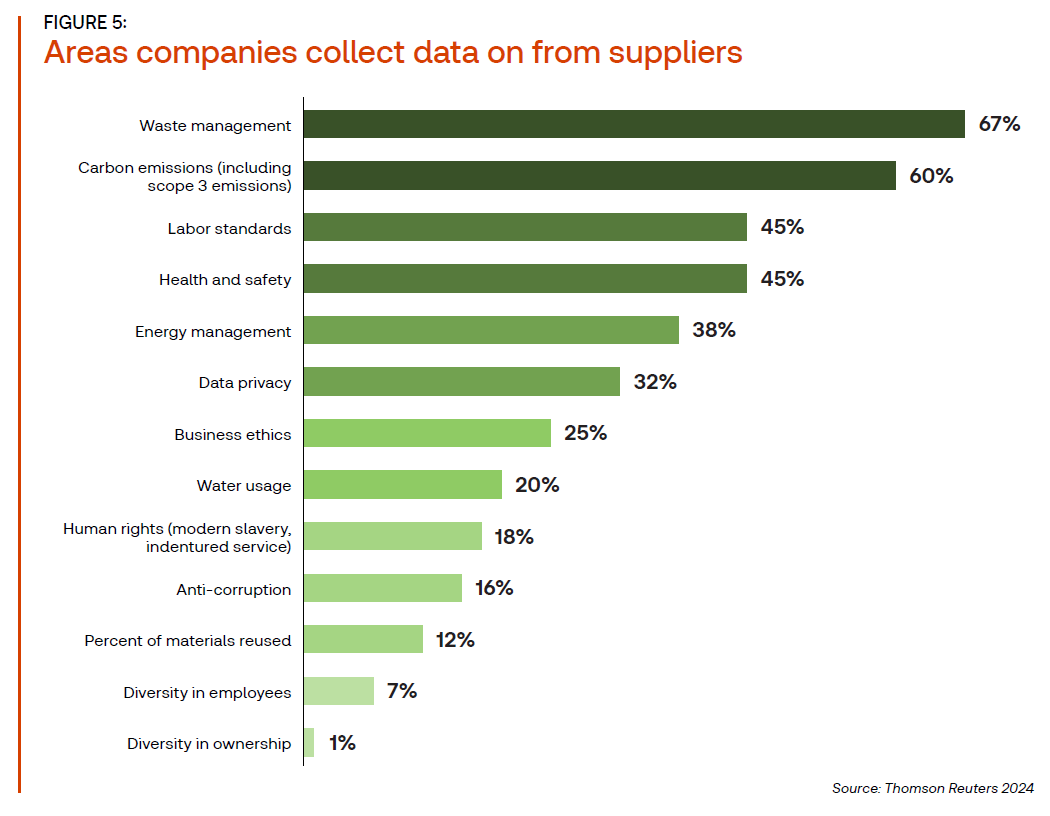A new study reveals that ESG factors are increasingly important in global trade and supply chain resilience, with businesses prioritizing ESG criteria in supplier selections in order to better mitigate risks
Many of the challenges and priorities faced by corporations and other businesses today can be found in their supply chains — the cornerstone of most global trade businesses. International sourcing, manufacturing, production, and distribution — by their very nature — often require intricate, extended networks that stretch across regions, exposing these networks to numerous factors that can impact businesses both financially as well as operationally.
Supply chain issues were by far the most frequently mentioned strategic priority for the coming year in the Thomson Reuters Institute’s recent 2024 Global Trade Report. In fact, supply chain due diligence was identified by survey respondents as the most impactful systemic change. Further, supply chain disruptions are a constant worry for global trade professionals, as the potential causes can be many-fold, from natural disasters to geopolitical events including wars. These disruptive events are common concerns among global trade experts because of their unpredictable nature in impact, timing, location and duration.
All these factors combine to present a multitude of scenarios that threaten to upend supply chains at any time. “Natural disasters and infrastructure issues frequently disrupt our supply chain, making resilience a top priority,” noted one trade professional who was surveyed in the report.
At the same time, however, other on-going potential issues present concerns that are more omni-present in nature. Issues such as shortages of labor or essential items such as shipping containers can result in both disruptions as well as increased costs. Infrastructure issues at all levels of the supply chain are also commonly mentioned as a source of disruptions.
Supply chain issues were by far the most frequently mentioned strategic priority for the coming year in the report, with supply chain due diligence identified by survey respondents as the most impactful systemic change.
As a result, many businesses are exploring diversification of suppliers — both in number as well as geographically — as a key strategy for improving supply chain resilience. Diversification can help protect against natural disasters and geopolitical events, localized logistics bottlenecks, work stoppages, and other disruptions.
Indeed, many of the drivers of diversification are caused by increased risks that are seen around environmental, social & governance (ESG) issues. For example, it is well documented that increased carbon levels in the atmosphere are in part a cause of climate change, which is leading to the intensification and frequency of natural weather disasters, like fires and floods. Likewise, as worker rights become a more integral part of human rights around the world, renewed focus on labor issues are increasing potential for work stoppages.
Given this, it’s unsurprising that global trade professionals are seeing ESG criteria as increasingly important in supplier selections. In fact, 81% of survey respondents said that ESG is important or very important in helping their businesses decide which suppliers to use, according to the 2024 Global Trade report. That is primarily driven by respondents in the United States (97% of whom said this) and in the United Kingdom and European Union (90%).
Conversely, it is an important or very important consideration for 70% of LatAm-based respondents and more than half (58%) of those from Asia-Pacific-based companies. By prioritizing suppliers that adhere to ESG standards, businesses can mitigate risks, enhance their reputation, and meet the growing demands of consumers and investors for responsible corporate behavior.
Regulation, customers & consumers driving need to collect supply chain data
At the same time, ESG-related regulation continues to add an additional layer of complexity to data collection, reporting, and supply chain management. In particular, regulatory requirements are the most critical factor driving companies to collect supplier data. According to the report, key drivers of decisions to collect supplier ESG data identified by respondents included regulatory requirements (with 80% of respondents citing this), requirements from significant customers (34%), investor pressure (28%), and reputational risk (19%). To underscore the point, one respondent stated: “Environmental regulations are becoming more stringent, pushing us to adopt more sustainable practices across the supply chain.”

Indeed, upcoming regulation, such as the EU’s Corporate Sustainability Due Diligence Act is driving companies to expand collection of supply chain data. In addition, major trading nations are increasingly adopting laws to mandating ESG reporting as well as to restrict or prohibit trade in goods that are not manufactured or produced according to emerging environmental, labor, and human rights standards. In 2023, the EU adopted the Corporate Sustainability Reporting Directive, which requires both EU and non-EU companies that meet certain criteria to publish regular reports on the social and environmental risks they face, and on how their activities impact people and the environment.
Preferences by significant customers, fueled by a growing consumer appetite for sustainable products, also has prompted companies to prioritize ethical sourcing and minimize their environmental impact. This emerged as the second most popular reason behind the surge in supplier data collection. “Meeting consumer demands for sustainability is crucial,” explained another trade professional. “And we are focusing on ethical sourcing and reducing our carbon footprint.”
Environmental issues are biggest area of data collection
Data on environmental issues, in particular waste management (67%) and carbon emissions (60%), are the most common areas of information that companies collected from their suppliers, according to the report. At the same time, almost half of respondents said their companies were also collecting supplier data on labor standards (45%) and health and safety (45%).

Clearly, ESG standards are now an integral part of business operations and global trade. Yet, balancing the need for supply chain diversification and complexity is not straightforward and underscores the need for businesses to prioritize resilience and adaptability in their operations. By acknowledging the interconnectedness of supply chain risks, ESG concerns, and regulatory pressures, companies can better position themselves to mitigate disruptions and capitalize on emerging opportunities in the global trade landscape.
You can download a full copy of the Thomson Reuters Institute’s 2024 Global Trade Report here.







